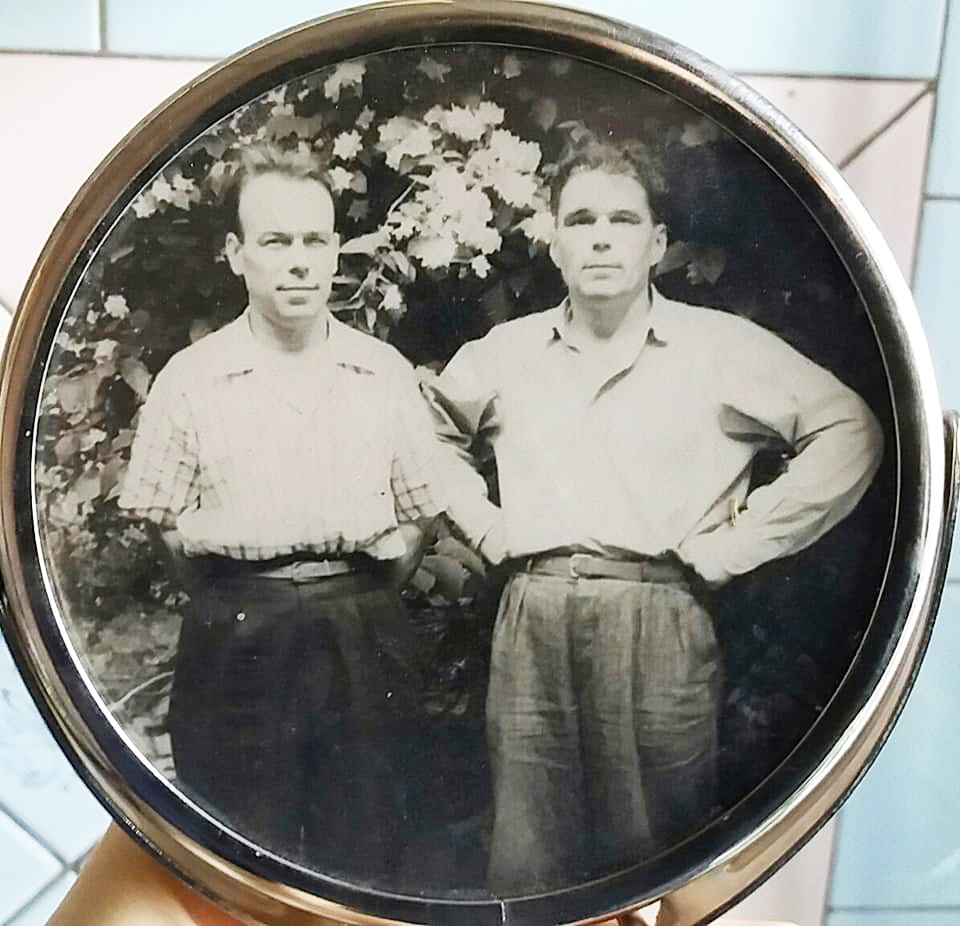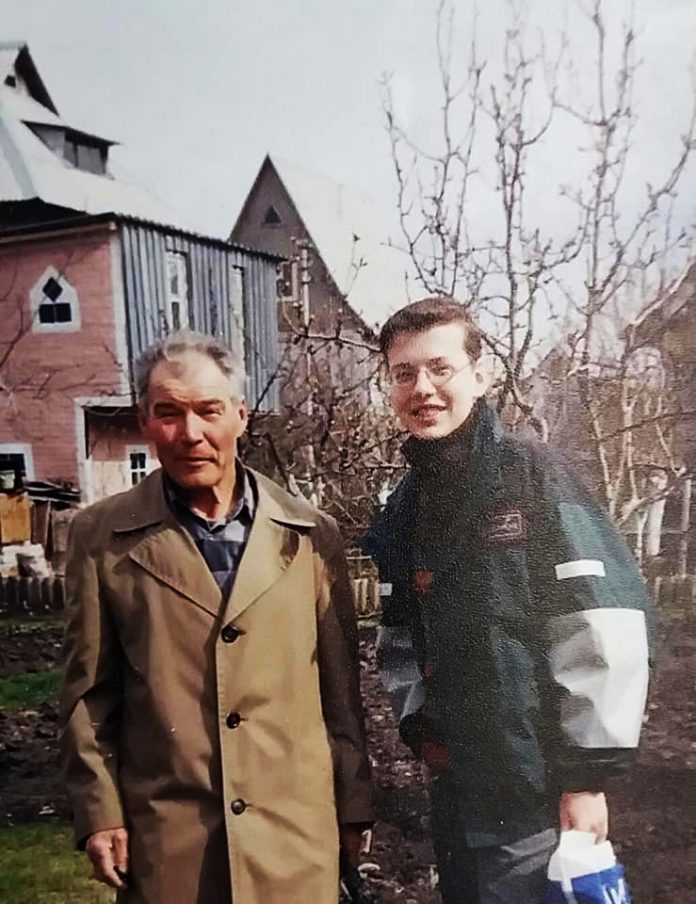Борису Чистяку й Надії Кир’яновій – світла пам’ять
І
Ти снишся в білому – як наречений,
чи в яблуневім цвіті – біля дому,
хоч молодого я тебе не знав:
«Що ж у війну? Була в нас річка Леглич,
а дядько мій по матері, Василь,
що паном став за німців, каже, поки
я бабраюсь, «ти будеш пасти гуси,
а я тобі – по склянці молока, і дрібку
солі», ось за ту роботу
мій брат і вижив. Старші, ті, ходили
на залізницю, різали дроти.
І голод, голод, дописали віку –
і верхи я на потягу, на Київ,
стрибав, забився, потім – конвоїром
аж за Урал, глядів і Василя,
вернувся з таборів – пили за мир». Ти – молодий,
а на обличчі – промінь,
в облеті цвіту, що ти насадив,
і що зайшовся грозовим розколом.
ІІ
Ти при вікні у сірому стоїш,
рукою обтираєш сиві сльози, дівочі ще:
«Така ця пісня, щось про сокорину,
про смерть і Україну, і любов, ось і реву, чого це?..
По війні? Із-за Уралу їхала до брата,
бо сирота, він відслужив, у ткацьке,
а дому ж не було тоді – бараки,
прийшов тоді та й каже: «ти побачиш, мене побачиш,
я усе зроблю, удвох нам легше жить», ну і живем».
А сонце б’є у шибку, до сльози: «отут вона і впала,
при вікні», не білий, сивий, сірий, мені кажеш,
а ластівки летять на південь нині
із дому, що його ти будував,
і що зійшов у кола замогильні.
ІІІ
Туманного лелеки ранній лет,
роса покосів, плеса виноградні,
за співом спів із променя у промінь,
за цвітом цвіт у золотім потоці
блакитнокрилому, до трепету латаття,
до страсті спадню, де тонув твій батько,
до перших матіол, коли в коханні
тонули й виринали, грім за громом,
у солов’ях літалось на дахи,
у куряві здіймали срібні зорі,
самі зоріли з любими у плесі
молочному, непевні, молоді,
у шумовинні кревних і незбутніх…
Зоря упала – і кровить вогонь.
IV
Немає саду, діду, є – війна,
немає, бабцю, тату, тітко, мамо,
вам дому – вбито стільки в нас нараз,
останньо я гарчу крізь чад і рід,
нитчину тчу під вибухами – в невідь,
як замовляння на крові – прожити
ще трохи, до вечірні, до зорі,
до рідної дружини, до дитини,
до слова, що несе із літ війни,
не згарище – любов живих і кревних,
оживлених на цій палкій землі,
де птахом – одвертатись над вогні,
над сон війни, свічадо снігопаду,
над місячного лицаря раї,
над листопади мертвих од відлиги:
цвіт яблуні од сонячного саду
паде, як нареченому – в лице.
Київ, 31.ІІІ.22

Retour au verger
Pour Borys Tchystiak et Nadiïa Kiryanova, in memoriam
І
Je te revois en blanc, comme un fiancé,
ou sous les fleurs du pommier,
même si je ne t’ai jamais connu jeune :
« Que dire de la guerre ? A Rjichtchiv,
un jour je cherche les poissons dans le Leglytch,
et l’oncle Vassyl, devenu un seigneur des nazis,
m’interpelle dans l’eau : « à toi de promener mes oies,
à moi de te donner un verre de lait et une poignée de sel »,
ce travail a permis de survivra à mon frère.
Les aînés, eux, coupaient les fils de la voie ferrée.
Famine sur famine. On me rajoute les années,
je pars à cheval sur le train à Kyiv, je tombe,
me tord la jambe et garde les criminels derrière l’Oural,
y compris l’oncle Vassyl, après son retour
on boit à la paix ». Tu es jeune quand même,
sans visage, rien qu’un rayon, sous les pétales
du jardin que tu as planté et qui s’engouffre dans les flammes.
ІІ
Tu es en gris à la fenêtre,
effaces tes pleurs de vieille, petite fille :
« C’est la chanson, sur l’érable, la mort,
l’amour et l’Ukraine, alors je pleure, pourquoi ?..
Après la guerre, de l’Oural je rejoins mon frère,
il reconstruit Kyiv, je couds jour et nuit,
alors on habitait tous, tous ensemble,
il vient, il dit : « je ferai tout, tu verras,
tu me verras, à deux c’est mieux », et on vit encore ».
Le soleil frappe la vitre, jusqu’aux larmes : « c’est ici
qu’elle est tombée » que tu me dis, tu n’es plus en blanc,
mais gris, les hirondelles s’envolent de la maison
que tu as bâti et qui descend dans les cercles infernaux.
ІІІ
L’envol du cigogne matinal,
la rosée sous la faux, les flots de vin,
chant après chant, rayon après rayon,
fleur après fleur je retrouve le fleuve d’or
aux ailes bleues, aux nénuphars tremblants,
aux passions du couchant où mon père s’est noyé,
aux matthiolas qui noyaient nos amours, tonnerre
après tonnerre, nous, rossignols inassouvis,
nous faisions briller les étoiles argentines,
nous brillions avec elles dans ces fleuves
lactées, jeunes, troublants, dans l’écume
de nos pères, de nos enfants non-nés…
L’étoile est tombée, ensanglantée de feu.
IV
Plus de verger, grand-père, c’est la guerre,
plus de maison, grand-mère, père, tante, mère,
tant de tués en nous en un instant,
je suis le dernier de la famille à râler
dans les fumées, à tisser le fil au-dessous
des missiles dans le néant, comme un charme
sur mon sang, pour survivre jusqu’à l’aube,
jusqu’à l’amour, jusqu’à l’enfantement,
la parole qui porte non pas les cendres,
la force des vivants et des morts ressuscités
sur cette terre brûlée, au-delà des brouillards de la guerre,
les miroirs embrumés des neiges, les paradis
artificiels du chevalier lunaire, les feuilles mortes
parce que trop verts dans le dégel :
elle tombe comme une fleur de pommier
du verger solaire que j’ai connu
sur ton visage de fiancé.
Кyiv, 31.ІІІ.22
Garden revisited
For Borys Chystiak and Nadiïa Kiryanova, in memoriam
І
I see you again in white, like a fiancé,
or under the cherry blossoms,
even if I never knew you young:
“What about war? In Rzhishchiv,
one day I look for fish in the Leglytch,
and Uncle Vassyl, who became a friend for the Nazis,
calls out to me in the water: «it’s up to you to walk my geese,
it’s up to me to give you a glass of milk and some salt»,
this work allowed my brother to survive.
The elders, they cut the wires of the railway.
Famine on famine, they add me the years
and send riding on the train to Kyiv, I fall,
twist my leg and keep the criminals in the Urals,
including Uncle Vassyl, after his return
we drink to peace”. You are still young
faceless, just a ray, under the petals
of the garden you planted and which is engulfed in flames.
ІІ
You are in gray at the window,
erase your old girl’s tears:
«It’s the song, on the maple, death,
love and Ukraine, so I cry, why?..
After the war, from the Urals I join my brother,
he rebuilds Kyiv, I sew day and night,
so we all lived, all together,
he comes, he says: “I will do everything, you will see,
you will see me, two is better”, and we are still living”.
The sun hits the window, to tears: «it’s here
that she fell” you tell me, you are no longer in white,
but gray, the swallows fly away from the house
which you have built and which descends into the infernal circles.
ІІІ
The flight of the morning stork,
the dew under the scythe, the waves of wine,
song after song, ray after ray,
flower after flower I find the river of gold
with blue wings, trembling water lilies,
to the passions of the sunset where my father drowned,
to the matthiolas who drowned our thunderous loves,
we unsatisfied nightingales,
we made the silver stars shine,
we shone with them in these rivers,
milky, young, disturbing, in the foam
of our fathers, of our unborn children…
The star fell, bloodied with fire.
IV
No more orchard, grandfather, it’s war,
no more house, grandmother, father, aunt, mother,
so many killed in us in an instant,
I’m the last of the family to moan
in the fumes, weaving the thread below
missiles, into nothingness, like a charm
on my blood, to live until dawn,
until love, until childbirth,
the word that bears not ashes,
the strength of the living and the resurrected dead
on this scorched earth, beyond the mists of war,
the foggy mirrors of the snows, the artificial
paradises of lunar knight, these dead leaves
because too green in the saw:
the word like a cherry blossom
of the solar orchard that I have seen
on your face of fiancé.
Kyiv, 31.ІІІ.22
Ritorno al frutteto
Per Borys Chystiak e Nadiya Kyrianova, in memoriam
I
Ti rivedo vestito di bianco, come una promesso sposo,
o sotto i fiori di melo,
anche se non ti ho mai conosciuto da giovane:
che dire della guerra? A Rjichtchiv,
un giorno cerco il pesce nel Leglytch,
e lo zio Vassyl che divenne un signore nazista,
mi sfida nell’acqua: «Tu bada alle mie oche,
Ti darò un bicchiere di latte e del sale”,
È il lavoro che ha permesso a mio fratello di sopravvivere.
Gli anziani, invece, hanno tagliato i cavi della ferrovia.
Carestia dopo carestia, sono trascorsi gli anni
e mandato in treno a Kiev, cado,
mi torco la gamba e sorveglio i criminali dietro gli Urali,
compreso lo zio Vassyl, dopo il suo ritorno
“beviamo alla pace». Sei ancora giovane,
senza volto, solo un raggio, tra i petali
del giardino che hai coltivato e che è in fiamme.
II
Sei alla finestra vestito di grigio
Cancella il tuo pianto antico, bambina
“ Questa è la canzone, sull’acero, la morte,
l’amore e l’Ucraina, perciò piango, perché?..
Dopo la guerra, dagli Urali raggiungo mio fratello,
lui ricostruisce Kiev, io cucio giorno e notte,
E così abbiamo vissuto tutti, tutti insieme,
viene, dice: — Farò tutto io, vedrai,
mi vedrai, in due è meglio -, e siamo ancora vivi”.
Il sole batte alla finestra, fino alle lacrime: » qui è
dov’è caduta” mi dici che non sei più vestito di bianco,
ma di grigio, le rondini volano via dalla casa
che hai costruito e che precipita nei gironi infernali.
III
Il volo della cicogna al mattino
sotto la falce la rugiada, i torrenti di vino,
canti e poi canti, raggi e poi raggi,
fiori e poi fiori, ritrovo il fiume d’oro
con le ali blu, con le tremule ninfee,
con le passioni del tramonto dov’è annegato mio padre,
con le matthiole che hanno annegato i nostri amori, tuono
dopo tuono, noi, usignoli inappagati,
abbiamo fatto brillare le stelle d’argento,
abbiamo brillato con loro in questi fiumi
lattei, giovani, sconcertati, nella schiuma
dei nostri padri, dei nostri figli non ancora nati…
È caduta la stella, insanguinata dal fuoco.
IV
Non c’è più il frutteto, nonno, è la guerra,
non c’è più la casa, nonna, padre, zia, madre,
tanti sono stati uccisi e noi in un istante,
sono l’unico superstite della famiglia a lamentarsi
nel fumo, tessendo il filo sotto
i missili nel nulla, come una magia
sul mio sangue, per vivere fino all’alba,
fino all’amore, fino alla nascita,
la parola che non solleva la cenere,
la forza dei vivi e dei morti risorti
su questa terra bruciata, oltre la nebbia della guerra,
gli specchi sfocati delle nevi, i paradisi artificiali
del cavaliere lunare, foglie morte
perché troppo verdi nel disgelo:
lei cade come un fiore di melo
dal frutteto inondato di sole che ho conosciuto
sul viso della tua promessa sposa.
Кyiv, 31.ІІІ.22 Traduzione dal francese di Laura Garavaglia
facebook.com/dmytro.tchystiak
Прокоментуєте?




